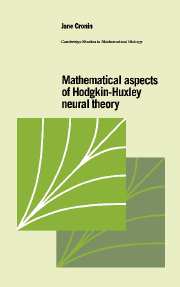Summary
The work of Hodgkin and Huxley on nerve conduction has long been recognized as an outstanding scientific achievement. Their papers were published in 1952 [Hodgkin and Huxley (1952a, b, c, d)] and they received a Nobel prize in physiology for their research in 1961. Hodgkin and Huxley's work was at once a triumphant culmination of many years of theoretical and experimental work by research physiologists and a pioneering effort that set the direction and defined the goals for much of the ensuing research in biophysics.
The purpose of this book is, first, to provide an introductory description of the work of Hodgkin and Huxley and the later work that is based on the techniques that they introduced. Our main emphasis is on the theoretical aspect of the Hodgkin–Huxley work, that is, the derivation and analysis of their mathematical models (nonlinear ordinary and partial differential equations); the second purpose of this book is to describe some of the mathematics that is used to study these differential equations.
The hope is that this book will indicate to some biologists the importance of the mathematical approach and will serve as an introduction for mathematicians to the mathematical problems in the field. However, this discussion is bound to be unsatisfactory to many readers. The biologists will find the description of the physiology simplistic, crude, if not actually misleading, and they may also be dubious about the value of conclusions that can be drawn from the mathematical analysis.
- Type
- Chapter
- Information
- Publisher: Cambridge University PressPrint publication year: 1987

